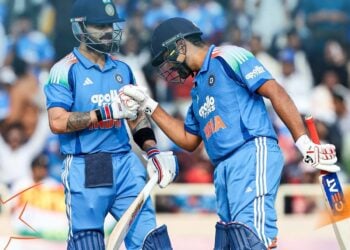Haris Rauf and Shahibzada Farhan have been found guilty of Level 1 offences under the ICC Code of Conduct following their controversial actions during Pakistan’s Asia Cup Super Four clash against India on September 21. The ICC has imposed sanctions on both Pakistani players after match referee Richie Richardson conducted formal hearings in Dubai, with Haris Rauf receiving a 30% match fee fine while Farhan was issued an official warning for their respective on-field conduct.
Table of Contents
ICC Sanctions Confirmed After Formal Hearing
The ICC announced its decision following comprehensive disciplinary hearings conducted by match referee Richie Richardson at Pakistan’s team hotel in Dubai. Both Haris Rauf and Shahibzada Farhan attended the proceedings in person, accompanied by team manager Naveed Akram Cheema, though they provided their responses in writing.

Haris Rauf was penalized specifically for “abusive language and aggressive gestures” during the heated encounter, while Farhan faced charges related to his controversial gun-firing celebration after reaching his half-century. Despite both players pleading not guilty to the charges, the ICC found sufficient evidence to proceed with sanctions.
ICC Sanctions Breakdown
| Player | Offence | Penalty | Details |
|---|---|---|---|
| Haris Rauf | Abusive language/gestures | 30% match fee fine | Level 1 Code of Conduct breach |
| Shahibzada Farhan | Inappropriate celebration | Official warning | Reprimanded by ICC |
| Level Classification | Level 1 | Standard sanctions | Up to 50% fine + demerit points |
The sanctions reflect the ICC’s measured approach to disciplinary action while sending a clear message about acceptable conduct during international fixtures.
The Controversial Incidents That Sparked ICC Action
The incidents that led to the ICC investigation occurred during Pakistan’s tense Super Four encounter against India in Dubai. Haris Rauf was captured on camera making gestures that appeared to reference aircraft downing while fielding near the boundary, including signaling “6-0” with his hands – an apparent allusion to military conflicts between the two nations.
Shahibzada Farhan’s controversial moment came when he celebrated his half-century by mimicking a gun-firing action with his bat, a gesture that was widely interpreted as politically provocative given the context of India-Pakistan relations.

The incidents occurred during what was already a highly charged atmosphere, with multiple confrontations between Pakistan’s bowlers and India’s opening batsmen throughout the match.
BCCI Complaint Triggers ICC Investigation
The Board of Control for Cricket in India (BCCI) filed an official complaint with the ICC against both Pakistani players via email on Wednesday following the September 21 match. The complaint specifically cited conduct that crossed the line of acceptable on-field behavior during international cricket.
The BCCI’s formal complaint was lodged with match referee Andy Pycroft, demanding strict action against both Haris Rauf and Farhan for their respective gestures during the six-wicket defeat to India.
Players’ Defense and ICC Verdict
Both Pakistani players mounted defenses for their actions during the ICC hearing. Haris Rauf maintained that his gestures were not directed at India and claimed his “6-0” signal meant nothing political. Meanwhile, Shahibzada Farhan defended his gun-firing celebration as a “traditional way of celebrating in his ethnic Pakhtun tribe” in Pakistan.
Despite these explanations, the ICC determined that the actions constituted breaches of the Code of Conduct, though the governing body distinguished between the nature of each player’s offense.
Key Hearing Details
- Venue: Pakistan team hotel, Dubai
- Match Referee: Richie Richardson
- Accompaniment: Team manager Naveed Akram Cheema
- Player Response: Both pleaded not guilty in writing
- Outcome: Level 1 offences confirmed for both players
The ICC explicitly warned both players to avoid repeating such infractions in future international matches.
Level 1 Offence Classifications Under ICC Code
Level 1 breaches under the ICC Code of Conduct typically result in fines of up to 50% of match fees and one or two demerit points. In this instance, Haris Rauf received the financial penalty while Farhan escaped with only a warning, suggesting the ICC viewed Rauf’s actions as more serious.
The classification as Level 1 offences means both players avoided match bans, allowing them to remain available for Pakistan’s upcoming Asia Cup final against India on Sunday.
Broader Context of India-Pakistan Tensions
The sanctions come against the backdrop of heightened tensions between India and Pakistan during the Asia Cup 2025. The tournament has witnessed unprecedented scenes, including India’s refusal to shake hands with Pakistan at the toss and after their group stage encounter on September 14.

The incidents involving Haris Rauf and Farhan were part of a pattern of provocative behavior throughout the tournament, with India captain Suryakumar Yadav also receiving a 30% match fee fine for politically charged comments following the group stage victory over Pakistan.
Tournament Disciplinary Actions
| Player | Team | Offence | Penalty |
|---|---|---|---|
| Haris Rauf | Pakistan | Gestures/language | 30% match fee |
| Shahibzada Farhan | Pakistan | Celebration | Official warning |
| Suryakumar Yadav | India | Political comments | 30% match fee |
The multiple disciplinary actions highlight the charged atmosphere surrounding India-Pakistan encounters in the tournament.
Impact on Asia Cup Final Availability
Despite the ICC sanctions, both Haris Rauf and Shahibzada Farhan remain available for selection in Pakistan’s Asia Cup final against India on Sunday. The Level 1 classification of their offences means no match bans were imposed, allowing Pakistan to field their strongest possible team.
Haris Rauf has been Pakistan’s joint-leading wicket-taker in the tournament with nine wickets in just 14.4 overs, making him crucial to their bowling attack. Similarly, Farhan has been Pakistan’s most consistent batsman with 160 runs, the highest for his team in the competition.
ICC’s Balanced Approach to Discipline
The ICC’s handling of the situation reflects a balanced approach to maintaining discipline while avoiding overly harsh punishments that could overshadow the cricket. By imposing financial penalties and warnings rather than match bans, the governing body has allowed the players to continue participating while sending a clear message about conduct expectations.
The decision to fine Haris Rauf while only warning Farhan suggests the ICC viewed the fast bowler’s actions as more problematic, possibly due to the sustained nature of his gestures throughout the match.
Precedent for Future Conduct
The sanctions establish important precedents for player conduct during high-profile international matches, particularly in politically sensitive fixtures like India-Pakistan encounters. The ICC has demonstrated its willingness to investigate and penalize inappropriate behavior while maintaining proportionality in its disciplinary measures.
The governing body’s approach sends a message to players that while passion and intensity are expected in international cricket, certain boundaries cannot be crossed without consequences.
Tournament Implications and Legacy
As the Asia Cup 2025 heads into its final between India and Pakistan, the disciplinary actions serve as a reminder of the broader implications of cricket between these two nations. The ICC’s interventions throughout the tournament highlight the challenges of maintaining sporting integrity while managing the geopolitical undertones that inevitably accompany these fixtures.
The sanctions against Haris Rauf and Farhan, along with the earlier penalty for Suryakumar Yadav, demonstrate that the ICC is prepared to take action against players from both sides when conduct standards are breached.
Read More: West Indies Star Bowler Shamar Joseph Ruled Out of India vs West Indies Test Series Due to Injury
FAQs
What penalties did Haris Rauf and Shahibzada Farhan receive from the ICC?
Haris Rauf was fined 30% of his match fee for abusive language and gestures, while Shahibzada Farhan received an official warning and reprimand for his gun-firing celebration during the September 21 match.
Will Haris Rauf and Farhan be available for the Asia Cup final?
Yes, both players remain available for selection as they were charged with Level 1 offences under the ICC Code of Conduct, which do not carry match bans.
What specific actions led to the ICC sanctions?
Haris Rauf was penalized for making aircraft-downing gestures and signaling “6-0” to Indian fans, while Farhan was sanctioned for his gun-firing celebration after scoring his half-century.
Who conducted the ICC disciplinary hearing?
Match referee Richie Richardson conducted the formal hearing at Pakistan’s team hotel in Dubai, with both players attending in person alongside team manager Naveed Akram Cheema.
What is a Level 1 offence under ICC Code of Conduct?
Level 1 offences typically result in fines of up to 50% of match fees and one or two demerit points, but do not carry match bans, allowing players to continue participating in tournaments.








